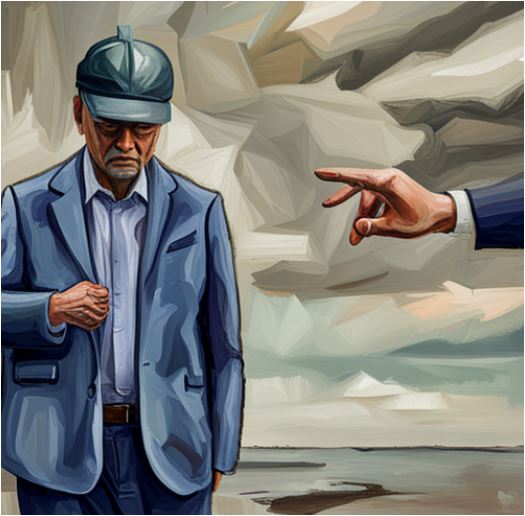They can’t help it?
Throughout history, U.S. politicians have often looked for external factors to blame when they can’t seem to fix their own problems. This year, both Mexico and China are unfortunately taking turns as the scapegoats of the political arena. Mexicans have been demonized and blamed for a wide range of issues, from drug trafficking to job competition, despite the fact that they contribute significantly to the country’s economy and culture. Similarly, China has been wrongly accused of everything from trade imbalances to human rights violations, even as many U.S. businesses rely heavily on Chinese manufacturing and consumers. While these accusations may seem politically normal, they do little to address the deeper issues at play and can ultimately harm diplomatic relations between nations.
American Politicians Use Scapegoating in order to Shift Blame.
The Mexican Scapegoat
Many American politicians have turned to blaming Mexico for various social and economic issues within the United States. This tactic is nothing new—it’s a well-worn strategy used to deflect blame and rally support from voters.
Drug Trafficking: It’s easy for leaders to point fingers at Mexico and claim that all drug problems in the U.S. stem from south of the border. However, this narrative oversimplifies a complex issue involving demand within the U.S., failures in American drug policy, and inadequate addiction treatment programs.
Job Competition: Mexican immigrants are often accused of “stealing” jobs from American workers. This rhetoric ignores the fact that many industries rely on immigrant labor to function. From agriculture to construction, Mexicans fill roles that are vital to the U.S. economy. Furthermore, economic studies show that immigrants often complement rather than compete with American workers.
The Chinese Scapegoat
China has long been a favorite target for American politicians seeking to explain away economic and global challenges.
Trade Imbalances: It’s easy to blame China for America’s trade deficits, but this ignores the broader context of globalization and the complex interdependencies of modern economies. Many American businesses depend on Chinese manufacturing to keep costs low and profits high. Tariffs and trade wars may sound tough, but they often lead to higher prices for American consumers and strained international relations.
Human Rights Violations: While it’s crucial to call out human rights abuses wherever they occur, using these issues as a political tool can be counterproductive. Constructive dialogue and international cooperation are more likely to lead to meaningful changes than public blame games that can spark nationalism and resistance.
The Harmful Consequences of Scapegoating
Scapegoating other countries may offer short-term political gains, but it has long-term consequences that can be detrimental to both domestic and international stability.
Diplomatic Strain: Blaming other nations for internal problems damages diplomatic relations. It fosters distrust and makes it harder to collaborate on global issues like climate change, terrorism, and economic instability.
Economic Impact: Trade wars and punitive tariffs can disrupt global supply chains, leading to higher costs for goods and services. Both businesses and consumers suffer when international trade is used as a weapon in political battles.
Social Division: Vilifying entire countries or their citizens can fuel xenophobia and racism. This tactic divides societies and creates an atmosphere of fear and mistrust among different cultural groups.
Addressing the Real Issues is not Normal in U.S. Politics.
Instead of pointing fingers at external enemies, U.S. politicians should focus on addressing the root causes of the problems they face.
Comprehensive Drug Policies: Tackling the drug crisis requires a multifaceted approach that includes better addiction treatment, education, and international cooperation to disrupt supply chains.
Economic Reforms: Strengthening the American workforce through education, training, and infrastructure investment will do more to create jobs and boost the economy than blaming immigrants for economic woes.
Constructive Diplomacy: Engaging in constructive dialogue and partnerships with other nations will yield better results than antagonistic rhetoric. Whether it’s addressing human rights issues or trade imbalances, cooperation is more effective than confrontation.
Conclusion
In the end, scapegoating other countries is a dangerous political game that ultimately benefits no one. It’s time for U.S. politicians to stop deflecting blame and start addressing the real issues head-on.

